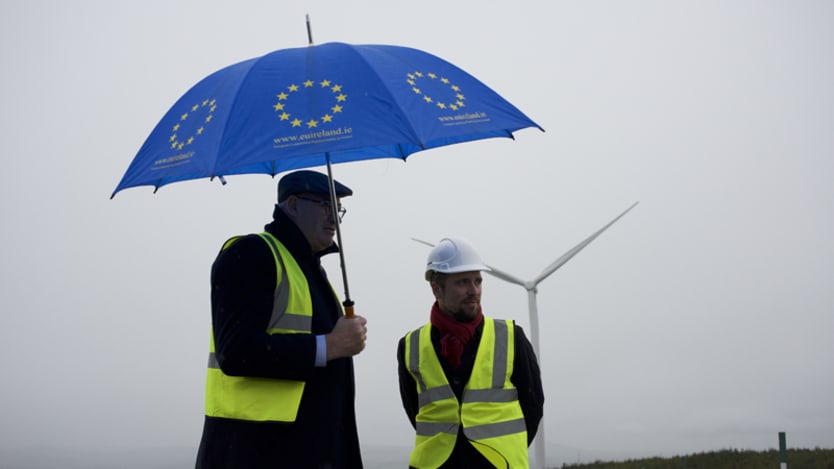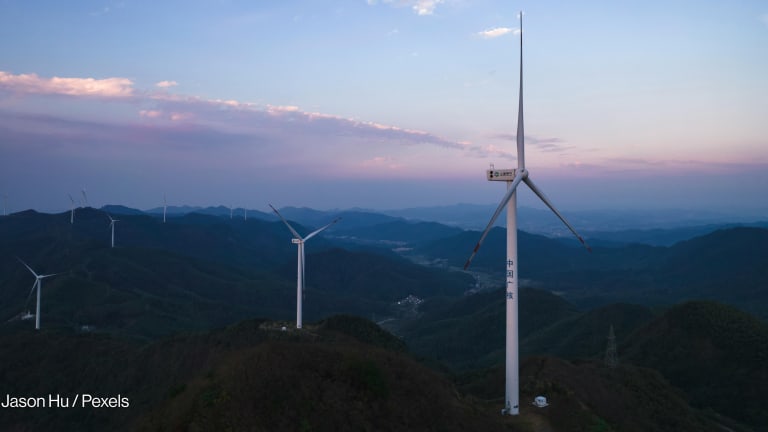
After United States President Donald Trump’s decision to withdraw from the Paris climate accord last week, many in the development sector are looking to the European Union to provide the leadership to enable emerging economies to meet their climate targets.
Over the last decade, developing countries — which bear the least responsibility for global warming, in terms of carbon emissions, and yet often suffer the worst of its impacts — have demanded and obtained recognition at global climate summits.
The U.S. decision risks reversing much of this progress, experts say. Emerging economies rely on climate aid to kickstart their clean energy development, and the already limited amount of money available for this huge task is now $2 billion lower, with the U.S. having halted its contributions to the Green Climate Fund.
The hope among many of those working on climate action is that the 28 member states of the EU, as well as other countries and non-state actors, can increase their funding to plug the gap.
But it's not just a matter of money. Experts told Devex that the loss of U.S. aid infrastructure on this issue — widely regarded as efficient and evidence-based in its combination of poverty alleviation with mitigation and adaptation efforts — will be sorely felt.
See more related topics:
► Private sector, migration, Brexit and climate change loom over the EDD
► Opinion: 4 ways cities are financing climate action
► Mayors call for local action and women leadership on climate change
► China could gain clout if US backs out of climate commitments, experts say
While Susanne Droege, a climate policy expert at the German Institute for International and Security Affairs, noted that additional finance "could buy time to get our head around a new situation" and implement measures in countries that remain committed to addressing climate change, many suggested that it is EU leadership on partnering with developing countries and other actors that could make the difference.
Speaking at the European Development Days in Brussels on Wednesday, European Commissioner for International Cooperation and Development Neven Mimica also stressed European leadership on climate change following Trump’s “regrettable” decision — but added that “we cannot do everything alone” and that partnership would be key.
Shared leadership
The EU has often been lauded for exporting its scientific and economic expertise on climate action around the world — but Andrzej Błachowicz, director of the consultancy Climate Strategies and a former climate negotiator for Poland, told Devex that "we are now moving to an era of more decentralised leadership [on climate change]."
Sustainable development will involve an increasingly wide range of actors, including multi-state donors, cities, businesses and local communities. "Rather than the EU sending their gurus to teach others what to do, the Paris Agreement is compelling [developing] countries to set up new government agencies, new regulations curbing air pollution, waive import tariffs on climate friendly products [and] support clusters of innovation," Błachowicz said.
By sharing experiences, big players such as the EU can offer help — but they can also learn from others, he believes.
Cities of tomorrow
City leaders aim to weather Trump's climate change backslide
In the age of Trump, mayors will lead on climate change action — and nations will follow, said former New York City Mayor Michael Bloomberg.
In the U.S., cities and states have reiterated their commitments to climate action in the wake of the federal government's decision. “President Trump should know that climate change is a dagger aimed straight at the heart of New York City,” mayor Bill de Blasio said in a tweet. On Wednesday, the governor of California Jerry Brown announced a new partnership with China on emissions reduction, warning that “disaster still looms” without urgent action.
In Europe, cities have been championing climate action with success for several years. One example of this is the Covenant of Mayors, a successful city-based initiative that has recently been expanded to Africa. To date, more than 7,000 European mayors have taken coordinated action to reduce their cities’ emissions by 40 percent by 2030, in what has been described by the EU Commissioner for Climate Action and Energy Miguel Arias Canete as the “world’s biggest urban climate and energy initiative.”
"By 2050, over a billion Africans are expected to live in cities," said Emanuela Colombo, UNESCO chair in energy for sustainable development at the Polytechnic University of Milan. "It makes sense that we target them if we want to reduce emissions and improve well-being."
Colombo explained that African cities’ potential for improvement "is so much higher than in Europe, because urban planners are only now starting to imagine and design the liveable cities of the future, as well as implementing energy efficiency measures."
Through cooperation, Nairobi, Kigali, Cape Town and other cities in Africa are taking advantage of European experiences in clean transport, energy efficiency and clean tech. In turn, they can offer insights into decentralised energy networks, climate change adaptation and more.
A four-year project to this effect — started in 2015 and run through the Covenant of Mayors — currently involves seven municipalities, with the Ugandan capital of Kampala as its headquarter. In its first stage, it is promoting the development of governance infrastructure and engagement with civil society, with the goal of developing a tailored plan for sustainable energy access and emissions reduction.
Decentralising energy and trade
Colombo believes that decentralising energy production will be crucial for African countries to meet their climate commitments under Paris — and that the EU can assist with technological and strategic expertise.
"Expanding the grid to rural areas is not always cost effective," she explained, "but complementing the main network with smaller independent power plants, often reliant on solar panels, will reach a greater number of people and increase the share of clean sources in the national energy mix."
Through the initiative ElectriFi, Europe is seeking to finance clean energy uptake in Africa through local entrepreneurship, which Colombo noted, "improves community engagement and generates more jobs than a central-grid model."
As cities and businesses increasingly take charge of the global climate response, researchers observe that weaving decarbonisation into regional trade agreements between the EU and other emerging markets would strengthen and speed up the process.
"There are hundreds of these regional trade agreements," said Harro van Asselt, a senior research fellow at the Stockholm Environment Institute. "So, for example, what if the EU and China started agreeing on certain standards for electric vehicles?" By having two of the world’s largest market forces team up, the lack of US leadership "could be easily bypassed" — particularly if individual states within the US joined too — he said.
Van Asselt said that trade agreements could help developing countries achieve their climate goals. "Regional trade agreements often include technical cooperation, and it's this type of agreement that, by increasingly addressing climate change issues, will provide potential for developing countries," he explained.
For example, as part of a regional trade deal, the EU could provide assistance on how to design and implement an emission trading scheme, as it did with China. The country received training from the EU on how to develop a greenhouse gas reduction system based on carbon credits. China is now primed to roll out its own program having built on the strengths of the European experiment — and having learnt from its mistakes, such as issuing too many carbon allowances that eventually caused the price of carbon credits to drop.
The China-EU partnership on emission trading is one example of how successful experiences can be shared and adapted in new environments. Whether mayors, businesses or coalitions of states, experts are increasingly coming to a consensus that moving away from a top-down approach to climate aid and embracing cooperation may be key to ramping up sustainable development.
It is through such an approach, they suggest, that developing countries will be empowered with greater resilience in the face of global power shifts and changes in climate leadership.
Read more international development news online, and subscribe to The Development Newswire to receive the latest from the world’s leading donors and decision-makers — emailed to you free every business day.








